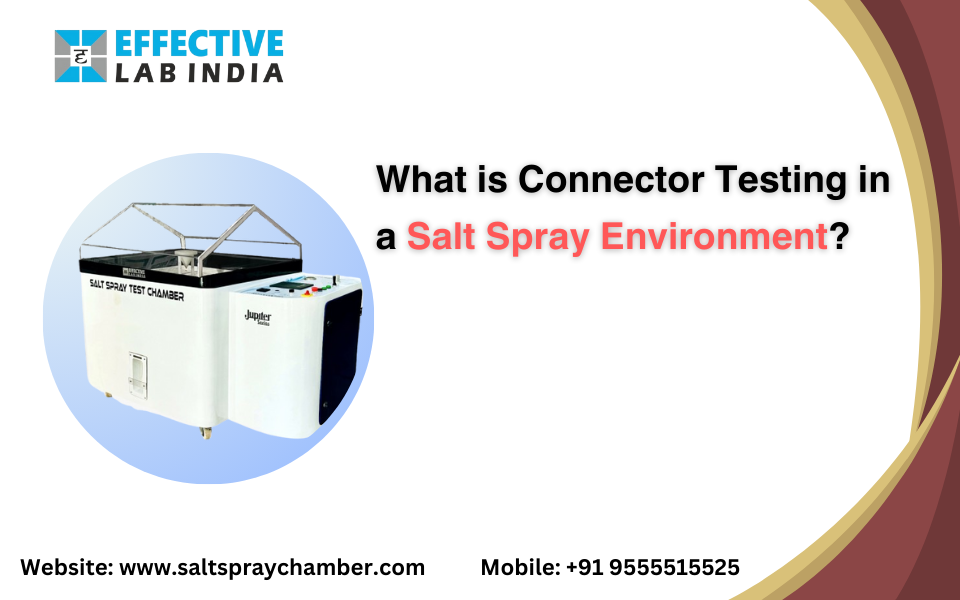by: Effective Lab India /salt spray test / Updated at: 2025-01-22 11:48:12

Connector testing in a salt spray environment is an essential procedure for assessing the robustness and corrosion resistance of electrical connectors under challenging circumstances. This kind of testing is crucial in sectors where connectors are subjected to high humidity, salt, and other corrosive substances, such as automotive, aerospace, electronics, and marine. By modeling these difficult circumstances, manufacturers can ensure the dependability and durability of their products.
What is Salt Spray Testing?
Salt spray testing evaluates a material's or product's resistance to corrosive environments by conducting an accelerated corrosion test in a controlled chamber. A controlled environment of salt-laden mist is produced using a salt spray chamber, sometimes known as a CASS cum salt spray chamber. This mist simulates real-world situations where parts might be exposed to salty environments, such as beaches or roads that have been de-iced.
The techniques and applications used in salt spray testing can differ. The most prevalent kinds are listed below:
1. Neutral Salt Spray (NSS) Testing
- A 5% sodium chloride solution is used.
- Conducted with a pH of 6.5 to 7.2, which is neutral.
- Perfect for testing connectors, coatings, and metals' overall resistance to corrosion.
AASS (Acetic Acid Salt Spray) Testing
-
To make the test more aggressive, add acetic acid to the salt solution.
-
Frequently applied to products that have aluminum alloys or anodized finishes.
Copper-Accelerated Acetic Acid Salt Spray (CASS) Testing
-
Copper chloride is used to hasten corrosion.
-
Engineered to test extremely resistant to corrosion coatings, including organic and electroplated coatings.
Cyclic Salt Spray Testing
-
To mimic natural weathering, alternate between drying conditions and salt spray.
-
Used, particularly in automotive applications, for sophisticated durability testing.
Types of Connectors Used for Salt Spray Testing
Depending on its intended use, several connector types undergo salt spray testing. These consist of:
Electrical Connectors
-
Used in automotive, aerospace, and electronic systems.
-
Testing guarantees dependable power delivery and signal transmission in corrosive environments.
Fiber Optic Connectors
-
Important for data transfer and communication systems.
-
Tested for performance retention in high-moisture and salt-exposed environments.
Circular Connectors
-
Frequently used in military and industrial settings.
-
Tested for corrosion resistance and mechanical robustness.
Terminal Blocks
-
Utilized in wire systems and electrical panels.
-
Over time, testing guarantees the integrity of connections
Automotive Connectors
-
Found in automobiles, especially in the undercarriage or underhood sections.
-
Tested for resistance to salt from chemicals used to de-ice surfaces.
Testing Standards for Connector Testing
Many industry and international standards govern connector testing in a salt spray environment for maximum uniformity and dependability among the essential criteria are:
ASTM B117
-
Standard Operating Procedure for Salt Spray (Fog) Equipment, ASTM B117.
-
Often used to test materials and coatings for general corrosion.
ISO 9227
-
Salt Spray Tests for Corrosion in Artificial Environments, ISO 9227.
-
Outlines the specifications for CASS, AASS, and NSS testing.
IEC 60068-2-11
-
Test Ka: Salt Mist is part of Environmental Testing, Part 2: Tests.
-
It focuses on how well electrical and electronic components work in the environment.
MIL-STD-810
-
The United States Military Standard for Laboratory Tests and Environmental.
-
Engineering Considerations is MIL-STD-810, which includes methods for testing military-grade components in salt fog.
JIS Z 2371
-
The Japanese Industrial Standard for Salt Spray Testing is JIS Z 2371.
-
Frequently used for product and material evaluation in Asian markets.
Compliance with these standards ensures that the test results are reliable and comparable across different laboratories and industries.
Importance of Salt Spray Testing for Connectors
Before being used in practical applications, salt spray testing assists in locating possible flaws in the materials, coatings, and design of connectors. By subjecting connections to a regulated saline environment, manufacturers can:
-
Guarantee adherence to industry norms.
-
Boost product safety and dependability.
-
Improve the safety and dependability of the product.
-
Lower the possibility of key applications failing.
-
Increase the longevity of connections used in situations that are prone to corrosion.
Conclusion
Connector testing in a salt spray environment is essential for businesses where dependability in challenging circumstances is critical. Utilizing cutting-edge tools such as the salt spray chamber and CASS cum salt spray test chamber guarantees that connectors fulfill the strictest requirements for longevity and corrosion resistance. By knowing the several forms of salt spray testing and the connectors evaluated, manufacturers can produce products that function flawlessly even in the most difficult circumstances.
